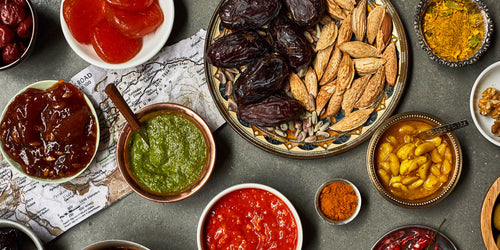Your Cart is Empty
As a child in his parents’ native Tunisia, Mansour Arem remembers Ramadan nights at his grandpa’s home in Tunis, where extended family would gather in anticipation of breaking their fast and sharing a meal. “My mother, my grandmother, my aunts, we'd all get together and there'd be a lot of cooking throughout the day without any eating,” he recalls, “so everybody is abstaining themselves [but] you have all these aromas and flavors.” As they all sat down to eat, Mansour recalls a distinct sense of both frenzy and deep calm—that feeling when “you're super hungry, and it's delicious, and your family is there, you're all enjoying it at the same time. It's amazing.”

While Mansour, 27, and his brother Karim, 26, were born and raised in Houston, Texas, they spent lots of time in Tunisia, their memories of which are inextricably intertwined with memories of eating. Last year at the start of quarantine, the brothers moved back to their hometown to co-found Zwïta Foods, centered on their signature Tunisian harissa. Their formula—based on their grandmother’s recipe, which Noura made at home—is full of rehydrated sun-dried Guajillo chiles that are ground into a vibrant paste with garlic, salt, coriander, caraway, and olive oil. They also make a hotter variation that’s punched up with chiles de árbol, and a sweet-and-spicy “habarissa” featuring fire-roasted habaneros, bell peppers, and honey.
At Zwïta, the brothers sought out to make products that are “unapologetically Tunisian,” to represent the foods that they grew up with in the place where they were born and raised. Mansour, who studied food science, says he’s “always felt that in the United States there was [this tendency that] everything has to be lumped.” Anything that’s from east or south of Europe, “what people consider the Middle East, they have to dump it in the same bag: harissa, hummus, it’s all ‘Middle Eastern food.’ [But] I always saw my food as its own distinct thing.”
“The United States is my home, but Tunisia is my home as well, so I have kind of this double perspective,” Mansour says.
The food culture in Houston also provides ample inspiration—and while Texas barbecue may be sacred territory, experimentation beckons. Nowadays, Mansour likes to play around with new uses for their product, in part shaped by that double perspective. He loves to incorporate it into classic Tunisian dishes, stirred into the street food staple lablebi—a brothy chickpea stew, warmed with cumin and studded with oil-packed tuna and crusty bread—or slathered on a baguette with potato, egg, and chopped salad for a classic Tunisian sandwich, or, perhaps scooped up with warm pita alongside olives, capers, and oil-packed tuna for a light Tunisian lunch. But also, he says, “I add it to anything that needs a little boost of flavor and maybe some spiciness without necessarily adding [just] the paste,” adding that he recently made a harissa vinegar, combining the harissa paste with some white vinegar and leaving it to condition for a bit before straining. “Sometimes I’ll just add it in [to whatever I’m making], which is something my mom would never do. She’s more of a traditional, ‘everything in its place’ kind of a person. I’m more what you would consider, [as] we say in Tunisian, ‘balbaaz,’ which is kind of messy, ‘everything mixed together.’

He also recently cooked up a harissa BBQ pork belly (“That stuff was good,” he assures me, “that stuff was really good”; get the recipe here) and envisions another Texas-Tunisia mashup: brisket rubbed with harissa, salt, and pepper. Eventually, Mansour dreams of throwing a big Viet-Cajun-style crawfish boil party in homage to Houston’s thriving Vietnamese community, featuring a cooking broth with plenty of smoky harissa mixed in.
“A crawfish boil is something that you do with a bunch of friends, and these days it’s not easy to organize something like that,” he says. But hopefully someday, maybe soon.








